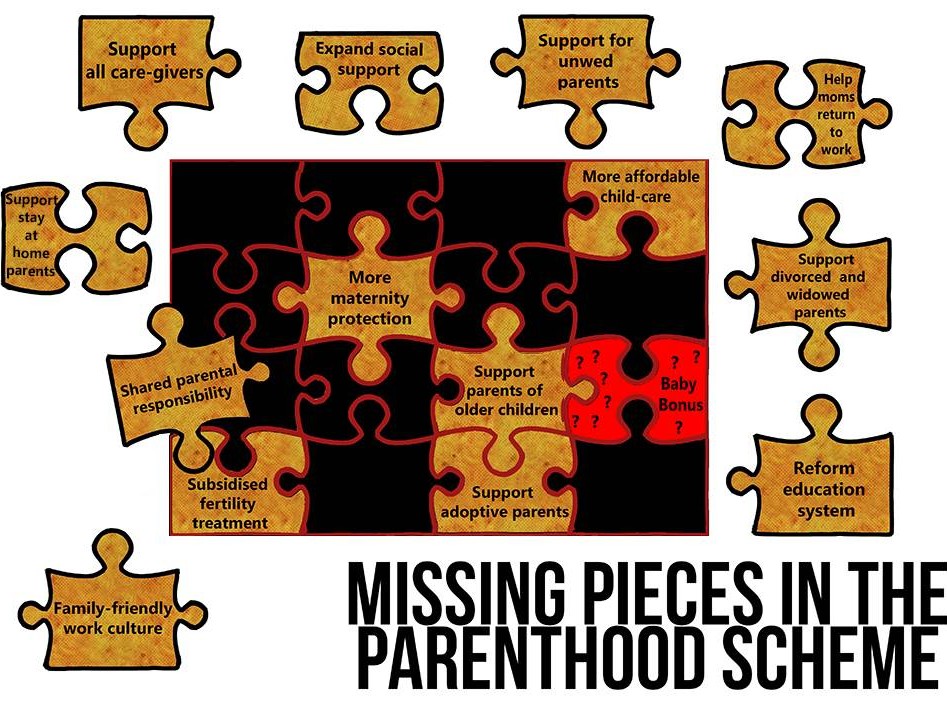-
Advocacy Theme
-
Tags
- Abortion
- Adoption
- Caregiving
- CEDAW
- Disability
- Domestic Violence
- Domestic Workers
- Harassment
- Healthcare
- Housing
- International/Regional Work
- Maintenance
- Media
- Migrant Spouses
- Migrant Workers
- Muslim Law
- National budget
- Parental Leave
- Parenthood
- Polygamy
- Population
- Race and religion
- Sexual Violence
- Sexuality Education
- Single Parents
- Social Support
- Sterilisation
- Women's Charter
Missing Pieces In The Parenthood Scheme
February 1st, 2013 | Children and Young People, Family and Divorce, News, Views
By Kokila Annamalai
Giving certain families access to piecemeal benefits will not solve the care-giving problem. We need to think about how we can build a more family-friendly society.
 Every Singaporean’s right to family and a good life – that’s the message we were hoping the new parenthood schemes would send out. But it is sorely disappointing to see that the latest policies still send a strong signal that the right to support for children is a privilege of the “ideal family” that meets the marital, employment and citizenship status prescribed by the state.
Every Singaporean’s right to family and a good life – that’s the message we were hoping the new parenthood schemes would send out. But it is sorely disappointing to see that the latest policies still send a strong signal that the right to support for children is a privilege of the “ideal family” that meets the marital, employment and citizenship status prescribed by the state.
This is counter-productive to fostering a sense of equality, community and belonging – sentiments which are fundamental to people’s decisions to start a family. Families come in all shapes and sizes, and policies must be mindful and supportive of the increasingly diverse choices Singaporeans make.
An incomplete picture
Baby bonuses and tax rebates haven’t worked over the last 20 years, and they won’t work now. Children are a life-changing, lifelong commitment – not something we can give people a “kickstart” on by offering them a lump sum of money. Like Einstein quite rightly said, “We can’t solve problems by using the same kind of thinking we used when we created them.” Rather than pumping more money into these short-sighted measures, we need to reflect deeply on what it is that people really care about.
A public survey conducted by AWARE in 2004 concluded that the quality of life is the single most important reason why Singaporeans are not having more children. People will only have children when they can imagine a good life for those children, and when the larger society reassures them that they will receive the support they need to care for themselves and their loved ones. This support must be in the form of universal benefits that all citizens have equal access to.
Greater social security, affordable public housing and pre-school education, as well as a flexible, stress-free work culture and an impartial education system that gives children of all backgrounds the same opportunities are important to give Singaporeans the peace of mind and confidence to consider starting a family.
Giving certain families access to piecemeal benefits will not solve the care-giving problem. We need to think about how we can build a more family-friendly society. When support is offered at the public level, rather than at the individual level, it will take the stress of comparing and competing with their fellow citizens off Singaporeans, and give them the autonomy to determine their own lives, and start families at their own pace.
Falling into place
The new M&P Package definitely shows encouraging signs of moving towards a more gender-equal and inclusive approach to care-giving, but bolder moves are necessary to change social mindsets about parenting.
The introduction of paternity leave is a positive step, but one week is not enough for dads to play a significant role in parenting. To lighten the load of working mothers and allow fathers to participate actively in childcare, paternity leave must evolve into a more substantial provision. A gender-equal approach includes helping moms return to work after childbirth, by providing job security and protecting them against discriminatory hiring practices.
And while the latest measures have expanded to include alternative modes of parenting such as adoption, we must broaden the definition of family beyond married parents, and the definition of care-giving beyond childcare, so that single, divorced, widowed or unwed parents and care-givers of elderly, sick or disabled family members all receive the support they truly need.
The move to heavily subsidise child and infant care services for middle and low income families gives us much hope that going forward, the State will adopt principles of equality and universality in place of individualised solutions and differentiated benefits.
As we cast a wider net to support parenthood, we must make sure that no family falls through the gaps.
The insights and recommendations in this article are heavily drawn from AWARE’s 2012 paper on Marriage and Parenthood Trends, submitted to the National Population and Talent Division. Read the full paper here.
One thought on “Missing Pieces In The Parenthood Scheme”
Comments are closed.





The reasons for the lack of interest in starting a family in Singapore are virtually limitless. The most glaring one that comes to mind is:
Work. People here work long hours, 5.5-6 days a week. The expression, “9-5” does not exist in this country. Companies, especially local companies expect their employees to work overtime and to even bring their workload home with them. How does the government expect couples to even consider the concept of children when they have to be at work at some atrocious hour in the morning only to return home at some godforsaken hour at night?
Other reasons may include:
Lack of a flexible work schedule. Singapore hasn’t quite cottoned on to the notion of working from home, have flexi-hours and allowing a bit of wiggle time in their daily work schedules. Emergencies come up; it’s an inevitability. And yet, many companies will see this as an excuse to potentially lay off a good employee.
Lack of daycare facilities in offices. Having a dedicated daycare center attached to an office would be a great incentive for parents to push out a bundle or two of joy but currently, this concept hasn’t quite caught on in Singapore.
Lack of space. Let’s face it, HDB apartments are horrifically claustrophobic. I’ve lived in houses that had living rooms bigger than an entire 2-bedroom HDB apartment. Kids need space to roam around. A front and backyard to frolic and scrape their knees in. Singapore just doesn’t have the space for such luxuries.
Standard of living. Singapore is expensive. Housing, medical, transport; the list can go on. Kids are extra financial baggage.
Meritocratic and competitive education system. I hear horror stories about kids failing their PSLEs and sobbing like their entire world had just collapsed beneath their feet. I hear about the immense stress and pressure put on kids to get straight As and “be the best”. With this kind of mentality, who wants to subject their future kid to that?
Baby bonuses. These incentives the Singapore government are dangling out like carrots are really only viable on a short-term basis. Money can only stretch so far; what if your kid ends up being a Math whiz, chem genius, star soccer player and master karate kid?
The emphasis on supporting your elderly parents. As previously mentioned, it is expensive to live in Singapore. Many Asian cultures dictate that taking care of the elderly folk is a given. Now, when you’re already stretching your paycheck to cover not only your expenses but your aging parents, how can the government expect one to bring children into the mix? Diapers, milk formula, extra curricular activities, pocket money, school fees/equipment, tuition (because this is Singapore), field trips etc, etc. All of these things cost money. And many people are already struggling to stretch that dollar.
Overall, I feel that unless the above issues are taken into consideration, the government is really just beating a dead horse. Couples are not going to entertain the idea of starting a family when their currently childless lives are already so stressful and hectic.